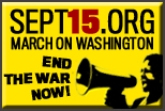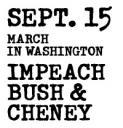Over to you, Washington: Sept 15 March to End the War
 Friends in the USA, its over to you for the Sept 15 March on Washington campaign. The rest of us will be there with you in spirit. The march and series of actions will involve many groups such as CodePink whose tenacious and creative activism is laudable.
Friends in the USA, its over to you for the Sept 15 March on Washington campaign. The rest of us will be there with you in spirit. The march and series of actions will involve many groups such as CodePink whose tenacious and creative activism is laudable.
 Gatekeeper Left groups who keep criticism of Israel off the agenda take note: this date is also the 25th anniversary of the massacres of Palestinians at Sabra and Shatila in Lebanon. This day, and September in general, is redolent with peoples history from many places.
Gatekeeper Left groups who keep criticism of Israel off the agenda take note: this date is also the 25th anniversary of the massacres of Palestinians at Sabra and Shatila in Lebanon. This day, and September in general, is redolent with peoples history from many places.
Here’s my stance on the effectiveness of marches and rallies. To be sure, marches and rallies usually are, on their own, insufficient. On their own, they do not stop wars as Jeff Gibb argues. But that overlooks other critical functions and reasons to choose to participate. Rallies can play an important role in the wider repertoire of actions available to us, especially when taken as a starting point or supplement to a wider campaign to disrupt business-as-usual, rather than somehow accepted as a substitute for this full range, as Catherine Fenton argues:
I will stay in the days after the march to engage in civil disobedience, to disrupt the business as usual of Congress as much as I can, and to plan further. Women didn’t get the vote the first time Alice Paul chained herself to the White House fence. But Alice Paul didn’t throw up her hands and say “what’s the use?” Blacks didn’t get access to voting booths the first time Martin Luther King marched. And there were always others who told him he hadn’t done enough. But he marched again and again, because he knew that every time he did, that was one more white American who said, this is not right.
There is no such thing as “just another protest.” You never know which one is the one that is going to tilt the scales and end up in the history books, or which one is going to give it just one more nudge towards that fateful tipping point. In either case, it’s something to be there for. There is a reason.
Those of us who take part in what we can do so because it renews our spirits, mitigates our apathy and despair, allows us to put our agency to good use. I do not write off any purposive and peaceful action: be it blogging, petitioning, civil disobedience, street theatre, prayers and vigils, sit-ins, singing … it all counts. In being neither doctrinaire nor dismissive about any single action, I invoke the words of Theodore Roosevelt: “Do what you can, with what you have, where you are“.
This week I was struck by a group of wonderful Chinese students recounting how they had never watched the iconic protest of a lone Chinese man with his shopping bags facing a huge tank in Tiananmen Square in 1989, beamed all over the world. It is not readily available in China — an important part of China’s history of dissent is not allowed to be part of the cultural collective memory. And that’s another thing that is at stake here, to add to the primary goals of saving lives, reclaiming our dignity, reasserting our right to live in peace: the ability to participate in history, the right to have reflected in the public transcript our own stories, actions and accounts, to own and author our historical roles, to make ourselves count.
I recently re-listened to an inspiring, rousing audio of a series of post peace-rally addresses saved on my computer from 2005, from an event in Washington DC. The series of excellent speakers culminates with George Galloway, the main address. I was moved listening to the dignified Camilo Mejia (one of the first war resisters in this Iraq war), Arab-American speakers and others, as well as the always funny and erudite George Galloway. It’s a long-ish (95 minutes all up) but most worthwhile listen. My suggestion is to turn it up loud while you’re doing something in which you can listen to it in the background, in installments if you’d like — recommended.
http://odeo.com/audio/16528553/view[odeo=http://odeo.com/audio/16528553/view]

i am not so sure.
i think one of the useful functions of these things is finding out you are not alone in being disgruntled. however, they do have their limitations
i wrote a piece about a similar thing..
http://tinyurl.com/yt7fwq
An excellent piece, Michael. It highlights how the surface success of some small, superficial bandaid acts mask the structural worsening of problems such as debt and inequality, which the Bob & Bono Show fail to address in the corporate, co-opted, guilt-free and falsely feel-good wankfests, as I think you memorably put it:
So what is to be done? You provide a clue when you write:
This kind of civil disobedience is being proposed for the General Strike on Sept 11, as I understand it. Corporate ooption is certainly a perennial problem for effective social movements. But while simply opting out wherever possible is laudable, it is not in itself a substitute for other propositional acts that manifest the “other world are possible” catchcry — cooperatives, community banks, alternative media, local energy grids etcetera.
Thoughts welcome.
hi
thanks for reading through that.
i agree with you that opting out is not always the option. for example, if there is not to be widespread disaster we have to make the change from oil to renewables now, while there is still an electricity grid running that we can use to do it.
but with the live 8 stuff for example i would suggest that it was actually counter-productive because the glamour and the proclamations served to give the idea that something had actually been done when it hadn’t. it was actually worse than being just a waste of time.